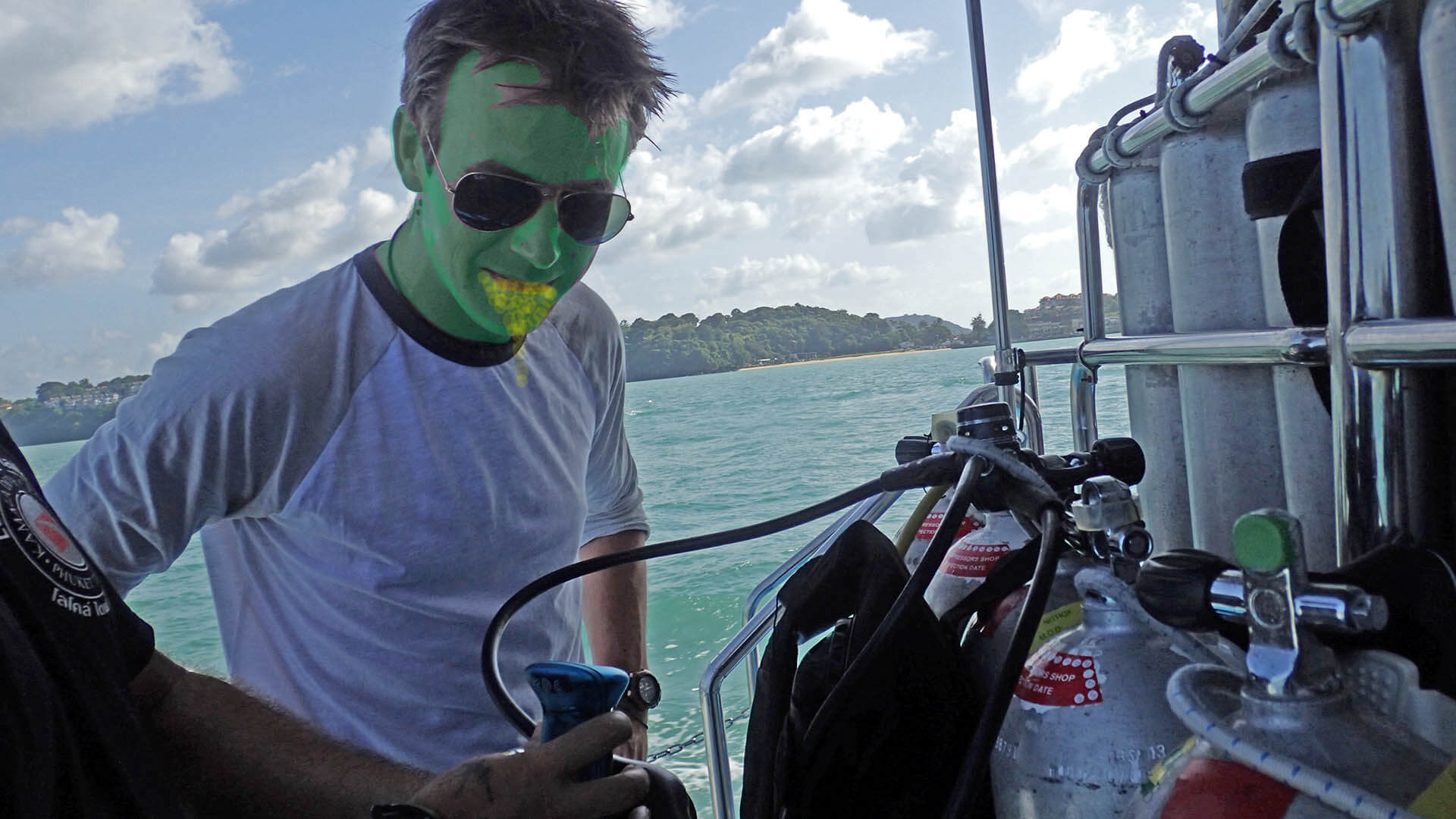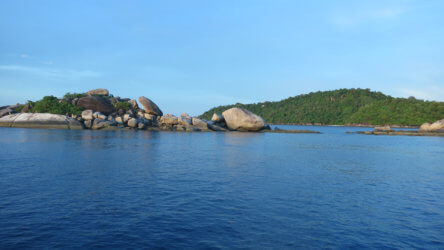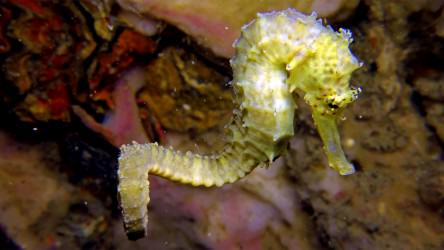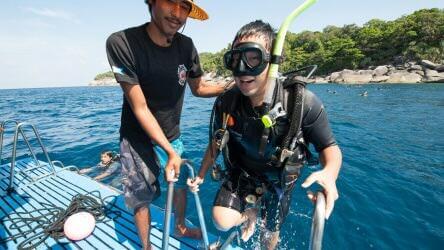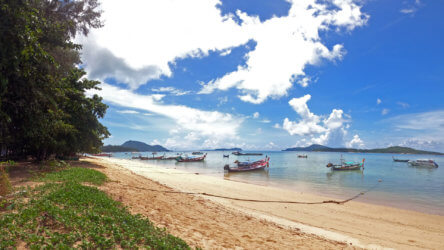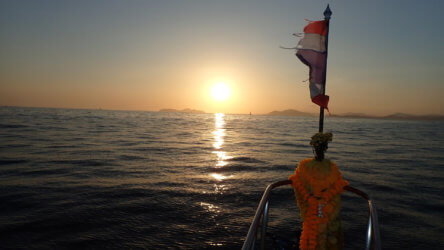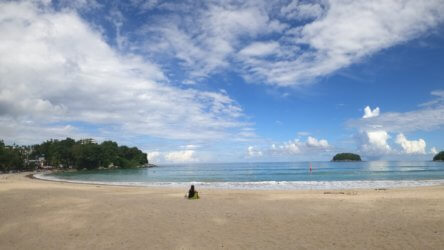Seasickness Can Really Ruin Your Phuket Dive Trip
How do I avoid seasickness is a question we often get asked. Fortunately throughout the Phuket diving high season we’re blessed with generally flat seas. Around the beginning of May we start to get a swell come in from the open ocean. Although for most this has little impact on your dive day, for those who get seasick it can be horrible but there are ways to avoid it.
What Causes Seasickness
Not going to go too far into the science but essentially your brain is being confused. With intentional movement (walking, running etc) all your senses are aligned and your body adjusts naturally. When you’re on a boat your eyes may have a static view (especially when inside) but your body is sensing movement either up and down or side to side. Your brain is basically not in sync with your body and can’t balance efficiently. The conflict between the inputs is thought to cause seasickness.
What Not To Do
- Drink Copious Amounts of Alcohol The Night Before – Obviously you should already be refraining from drinking too much the night before diving but already feeling queasy isn’t going to help matters
- Eat Greasy Food – Try to have a light breakfast and avoid fatty and greasy foods. Oatmeal, simple cereals and fruit are the best options
- Stand Near Fumes – Definitely not going to help matters, kitchen smells, exhaust fumes and cigarette smoke can all trigger vomiting
- Read – Your eyes will be fixed on a static object so a definite no. If you’re participating in a PADI course try to get all the theory complete before getting on the boat. Elearning would be a great option
- Talk To Your Instructor – Again eyes fixed on a static object, face the horizon and listen, you don’t have to directly stare at your instructor/guide during the briefing. It may seem rude but we understand
Simple Tricks To Relieve Symptoms
- Watching The Horizon – simply standing up and looking at the horizon lets your eyes see the motion and your brain can sync in
- Lying Down – Most sufferers will end up in this position anyway but if you start by choosing a good spot on the boat and crash out you may well prevent feeling nauseous. Cover your eyes, hang up the do not disturb sign and sleep is probably the best preventative measure
- Closing Your Eyes – Can’t be a conflict if your eyes can’t see anything
- Chewing – Not sure why but chewing gum or sucking sweets helps reduce the conflict. Nibbling on chocolate can also help
- Fresh Air – Probably just because avoiding foul odours and fumes can relieve nausea
- Don’t Be Shy! – Our tour leader will offer free seasick pills during the morning briefing, if you’re not sure just take one, feeling a little drowsy is much better than feeding the fish
Prevention Is Better Than Cure
There are many different kinds of seasick medication, some clinically proven and some made up by witch doctors. If you’re already aware that you suffer from motion sickness then visit your doctor before travelling to get the right remedy for you. They’re rarely expensive (the pills not the doctor) and readily available.
Pills, Thrills And Hopefully No Bellyaches
We use dimenhydrinate tablets and as mentioned before they’re available free of charge on the boat. They do cause drowsiness in some individuals but are relatively side effect free but it’s a good idea to check with your doctor.
Ginger sweets/tablets or ginger tea work fairly well if you want to stick to a more natural remedy. They have no side effects at all and for that reason we would recommend giving them a go.
If somebody suggests sacrificing snails and praying to the baked bean god of Saturn then congratulations! You’re friends with either a witch doctor or a lunatic and needless to say it’s not gonna work.
Acupressure wrist bands possibly work. It’s not something we have great faith in and so will remain firmly in the dubious column.
Do Try To Dive
You probably won’t feel like it but we generally dive in the safest most sheltered spots when the weather is being a bit of a twat. Jumping into a fairly flat sea can make you feel better almost immediately and certainly when you descend your body and brain will be able to get back in sync.
Your guide/instructor or even your buddy will understand what you’re going through so maybe ask them to set your equipment up, again avoiding concentrating and making you feel worse.
If the surface is still choppy at the dive site then you may be better off staying in your happy place especially if you’ve not been able to properly hydrate.
Don’t be concerned about vomiting on the surface or even underwater, your regs can handle it and you’ll attract the fish, making you the favourite buddy of the group. Seasickness does have one advantage…
If you feel like vomiting on the boat then do it! You’ll probably feel better but please make sure you don’t throw up on other peoples gear especially if they’re wearing it. Choose a safe position (our staff will help you) to vomit overboard and be careful of the wind direction, you don’t want it coming back at you
If All Else Fails
If none of the above helps then you’ll just have to be very careful in choosing your dive destinations. There’s some excellent shore diving around the world. Many places like Thailand have relatively flat seas during the high season. If that doesn’t work then it’s time to choose a new hobby…
We Will Help
Let us know if you suffer from motion sickness and we’ll recommend the best diving day trip for you but most of the year the seas are calm around Phuket. We’ll keep you abreast of weather conditions and let you know if it’s not a good idea for you to go. Obviously there’ll be no cancellation fees. We want everybody who joins us for diving or snorkelling to have the best possible experience.
Posted in Scuba Diving Health on .
